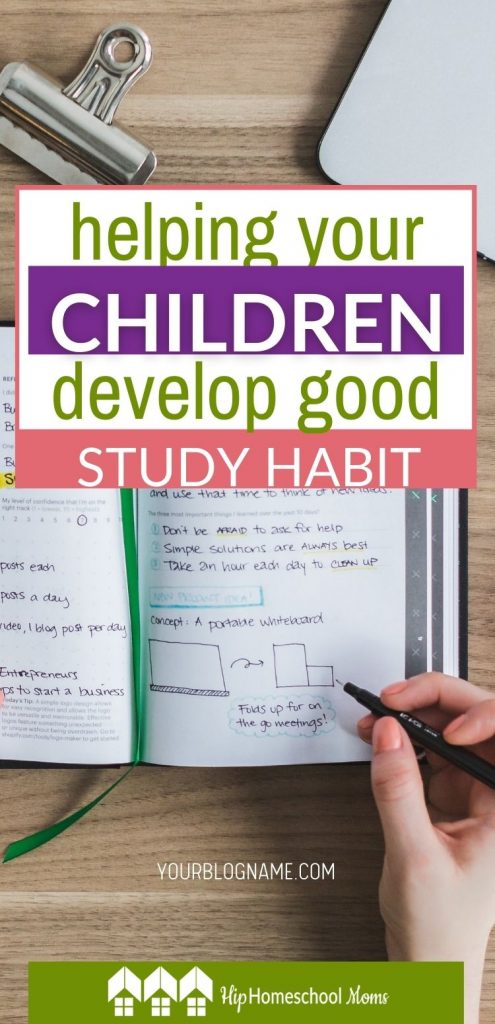Helping Your Children Develop Good Study Skills
A while back, we posted an article about figuring out if you need to teach your child how to study It’s funny, because at first glance this one may seem like a given–“Of course!” After all, as homeschool parents we are right there with our children, teaching them every subject and walking them through the process of learning each day.
It can be easy, though, to miss the opportunity to sit down with our children and teach them how to study independently. (I went to public school, and I don’t remember ever being taught how to study there either.) The article above (Click the bold-print title of the article in the first paragraph.) will help you understand more about why you may never have realized your child didn’t actually know how to study.
It may sound like a difficult task, but there are some simple ways to start teaching your children how to study. It doesn’t have to be a challenging, scary ordeal! Keep reading to find out more.

Helping Your Children Develop Good Study Skills
So, how do you teach your children to study? While every child will have to take this information and tweak it here and there to make it work for him or her, there are some basic habits that our children need to develop before making these skills more personal. Here are 7 of them!
1. Teach your child to listen and pay attention during the lesson.
One thing that many students don’t do is simply listen and pay attention during the lesson. Whether the student is listening to an online class, listening to Mom read a story or lesson, or even listening to himself as he reads his own lesson, he needs to really listen and pay attention to what is being taught, said, and read. Try these ideas:
- It may be that we need to help our students practice their listening skills by reading short passages to them and then asking questions.
- Some students may simply need to be reminded occasionally to pay attention until it becomes a habit.
- It might even be helpful to set a timer to go off at intervals throughout the class period or throughout the day for the purpose of reminding the student to pay attention.
- Younger (more wiggly) children may need to learn to sit still and put on “listening ears,” before getting started.
Whatever system works well for you and your child(ren), implement it! Try out a few different systems, choose what works best for your child, and put that system in place. This is definitely one of the keys to getting ready to improve study skills!
2. Regularly make sure your child actually understands the material.
Besides just listening, the student needs to understand the material. I know this seems basic, but many students just want to get through a lesson quickly, so they don’t take the time during the lesson to clarify information in their minds. Younger students probably get help from the mom/teacher in this area as the lesson progresses because younger students are often taught by the mom (although more and more dads are homeschooling nowadays), and she probably makes sure they understand.
Middle school and older students, though, must take more responsibility for themselves to make sure they understand before moving on. You can help by encouraging them to demonstrate understanding by writing down practical examples or summaries of what they’ve just learned. Or, take a few minutes to discuss the material with your older child. That’s a great way to make your child feel more responsible for learning and to give your child a chance to show off his or her knowledge and skills!
3. Teach your child to skim chapter titles, subtitles, charts and graphs, etc. before reading the chapter.
Another tip that can be very helpful is simply skimming the chapter title, subtitles or section titles in that chapter, charts or graphs used in the lesson, and even the first sentence or two of each paragraph in order to get an idea of the most important information from the lesson. If the student keeps the main idea(s) in his mind, she can more easily recognize information that is pertinent to the lesson and that which is not as important to remember. Part of successful studying is simply narrowing down what’s important to remember and what isn’t.
When I read a fictional book for fun, I enjoy reading a short description of what the book is about before I start reading the book itself. The description tells me a little about what will happen in the book, and that helps me know what to pay close attention to as I read. This same principle applies to reading informational books and textbooks.
4. Make sure your child knows how to take good notes.
Taking good notes is extremely important–especially for older students! Younger students may be given study sheets that have been prepared ahead of time for them, but most older students (middle school and older) are responsible for creating their own study notes. It is very helpful for many students to go through the process of writing down lesson notes and study notes.
I’m the kind of learner who has to rewrite things in order to learn them. Even if writing isn’t necessary for your student to learn and remember the information, it is still a wonderful tool! Writing (and reading out loud as he writes) allows the student to see the information (for visual learners), hear the information (for auditory learners), and do something with the information (for kinesthetic learners). I know that many students don’t like to write, but I wouldn’t rule it out because it can be such a wonderful study habit!
5. Help your child create a study schedule.
Making a study schedule can be helpful. When I was a student and had a test or project or paper coming up, I always put off working on it until the very last possible minute. I could think of a host of “reasons” that I couldn’t study right at that moment. Then, when it came down to the last minute, I finally knew that I had no choice, and I buckled down to study. My children are the same way! I realized this is especially helpful and even necessary for my children. If we make out a study schedule and set aside specific days and times for studying, they are much more likely to study for days (or even weeks) ahead of time instead of waiting until the last minute.
6. Use practice tests.
Creating and taking a “practice test” was very useful for my son (who has now graduated from our homeschool). Not only did creating his own test cause him to have to review the information, but it also required him to write or type the information out. Without even realizing it, he was practicing and studying the information over again while creating his own practice test. Then taking the practice test was yet another opportunity to review the information.
If your child isn’t yet ready to create his or her own practice test, there are other ways to create the same effect. Some curriculums actually come with practice tests, or you can create them, or you can help your child learn to create them. If you have an older child who is willing and able to help, you can even have him/her help out by creating practice tests for the younger sibling(s)!
7. Review information often!
Even if there isn’t a test coming up soon, encourage your student to read over each day’s lesson and the information from previous lessons each day. This is not the same as making a study schedule. This is done every day either after class or at the end of the school day. The student simply reads over her notes and pays close attention to them. She’s not attempting to remember the information, but that will come anyway because she will be seeing the information over and over. Then, when a study session arrives, she may be surprised at how much she already knows!

These are just a few study skills that have worked for my own family. I would love to hear from you about any tips or study skills you can share with us!















Thanks!! I was eager to read this post. Great tips. I find I am one of the biggest hang ups for my kids. I find myself telling them to hurry up and finish. Of course I do not mean for them to fly through the work and not understand any of it, but that is how they take it. So I reallly need to make sure they understand what they are learning and just tell them to get back on task – not rush. But as my kids are now beginning the middle school years I really wanted some great advice on how to help. Thanks
Great post Wendy! Since our girls are little we are in the ALL WIGGLE stage, but I will file this away
Wendy, as a Study Skills teacher I would agree you have some excellent points and they are ones few students are actually taught. At Victus Study Skills System we have learned over our thirty five years of teaching study skills that students are taught to try harder, yet we know that doesn’t work! Proverbs tells us that “zeal without knowledge is not good” and that applies to studying too. There are methods of listening and taking notes and taking tests and we can’t expect students to figure out those methods very effectively. They need to be taught.
I hope your readers will visit our website Home Educator page. Cathy Duffy has stated quite well that our system of study helps students set goals and develop action plans and then put those action plans on a calendar. They can apply these same skills in life, so they become successful in school and in life!
Really great tips here, I love the idea of asking them to pay attention during the lesson as well as setting up a study schedule. Mine hate to study. Perhaps using these tips I can change that.
Why do keep saying: “mom.” why don’t you say: “moms and dads.”
Because, while we do have some dads that read our articles, we are primarily a site for moms. 🙂 There are beginning to be more homeschool-related sites for dads too, though!